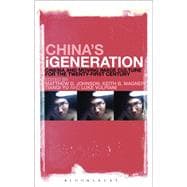This innovative collection of essays on twenty-first century Chinese cinema and moving image culture features contributions from an international community of scholars, critics, and practitioners. Taken together, their perspectives make a compelling case that the past decade has witnessed a radical transformation of conventional notions of cinema. Following China's accession to the WTO in 2001, personal and collective experiences of changing social conditions have added new dimensions to the increasingly diverse Sinophone media landscape, and provided a novel complement to the existing edifice of blockbusters, documentaries, and auteur culture. The numerous 'iGeneration' productions and practices examined in this volume include 3D and IMAX films, experimental documentaries, animation, visual aides-mémoires, and works of pirated pastiche. Together, they bear witness to the emergence of a new Chinese cinema characterized by digital and, trans-media representational strategies, the blurring of private/public distinctions, and dynamic reinterpretations of the very notion of 'cinema' itself.








